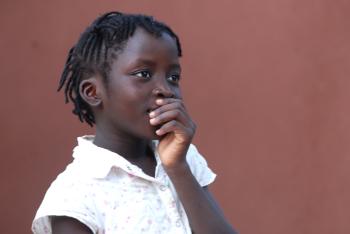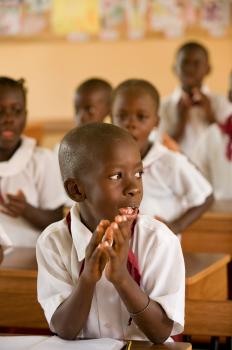Lacking access to social services and facilities endangers lives

Young girl at the children’s village (photo: C. Ladavicius)
When it comes to reproductive health, too, there is a severe lack of services and information campaigns. The high costs of transportation to health facilities and of medicines continue to be a problem for the local population. In addition, facilities are often understaffed, or staff are not sufficiently trained in areas such as emergency obstetrics. These factors all contribute to the high rates of both infant and maternal mortality in the region. Severe malnutrition, especially in children, and diseases like malaria, diarrhoea and respiratory diseases, as well as the HIV/AIDS pandemic have aggravated the health situation.
Education is crucial for social inclusion
The overall conditions of poverty make the population very vulnerable, especially single or widowed women, unmarried young people, migrants, internally displaced people, and of course children. The distribution of wealth in the country is highly unequal, and people with a lower social status have limited access to productive resources such as land, skills, or capital. This makes them highly dependent on others – usually the husband or senior male of the family.
Literacy is also very low, at an average of 42.4 per cent. But while 58.1 per cent of men can read and write, only 27.4 per cent of women can. Part of the reason for this discrepancy is the fact that girls are expected to take on traditional roles within the family, marrying young and going on to have large families. However, without being able to read or write, access to information is restricted, and exclusion from social and economic processes is the result. This makes it incredibly hard for girls to become independent, self-determining adults.
Literacy is also very low, at an average of 42.4 per cent. But while 58.1 per cent of men can read and write, only 27.4 per cent of women can. Part of the reason for this discrepancy is the fact that girls are expected to take on traditional roles within the family, marrying young and going on to have large families. However, without being able to read or write, access to information is restricted, and exclusion from social and economic processes is the result. This makes it incredibly hard for girls to become independent, self-determining adults.
What we do in Canchungo

At the SOS primary school in Canchungo (photo: C. Ladavicius)
For children from the region who can no longer live with their parents, twelve SOS families can provide a loving home for up to 120 children. In each family, the children live with their brothers and sisters, affectionately cared for by their SOS mother.
The children attend the SOS Kindergarten together with children from the neighbourhood. This ensures that they make friends and are integrated into the local community from a young age. The kindergarten is very important to the local population as it allows single mothers and working parents to leave their children in safe hands while they are out making a living. The children then continue their education at the SOS Hermann Gmeiner primary school, which is attended by up to 420 pupils. Due to the scarcity of schools in the region, the presence of the SOS school is very important here.